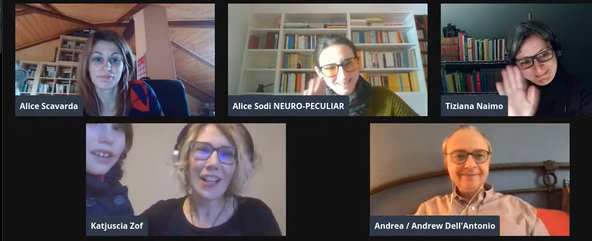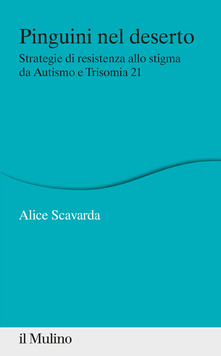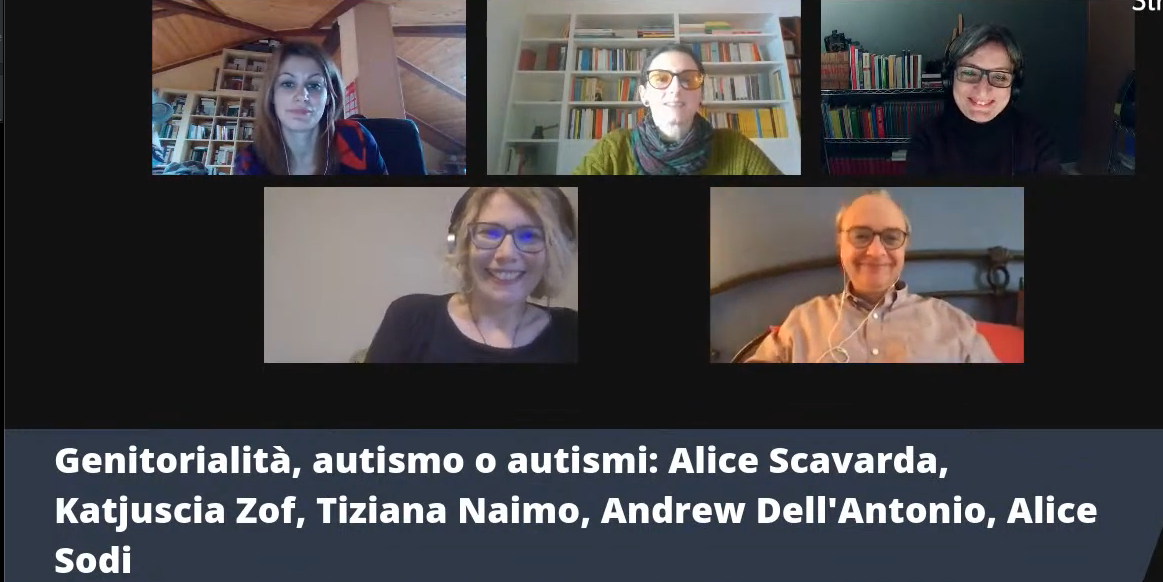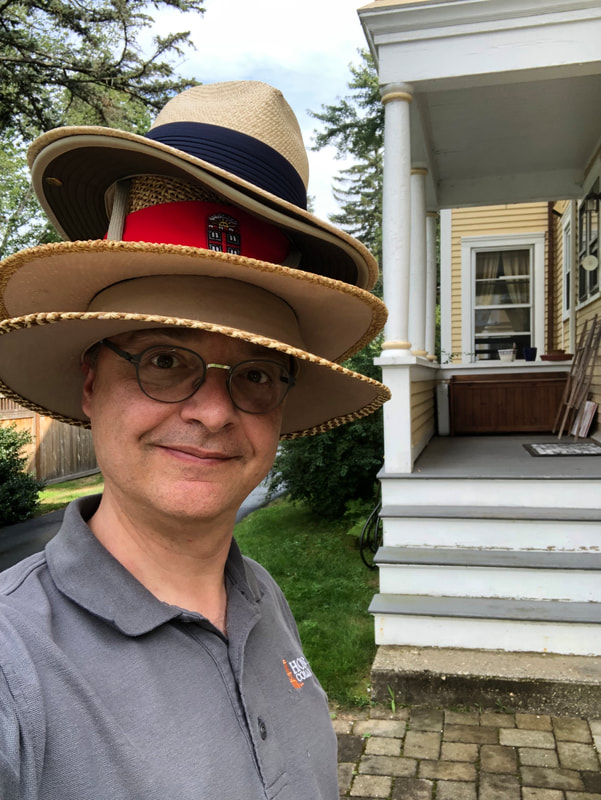|
Last week, in the midst of the Texas Snowpocalypse, I had the pleasure and privilege of participating in a multi-session online event/conference on neurodiversity called AUTCamp Off, coordinated by my colleagues and friends at Neuropeculiar, an organization run by Autistic activists based in Italy with members throughout southern Europe. I’ve been collaborating with the folks at Neuropeculiar for almost a year, helping with English translation of subtitles for their videos and working on joint projects of various sorts. I was especially honored to have them reach out to me to join panels on parenting and workplace neurodiversity as part of this virtual mini-conference.
I may blog about the workplace session later, since it was definitely very interesting, though I can’t say that my contribution was especially brilliant. But I first want to focus on the first session, called "Genitorialità, autismo, e autismi" (Parenting, autism/autisms), during which I joined Alice Sodi, President of Neuropeculiar and Tiziana Naimo, author of the brilliant neurodiversity information and humor site Bradipi in Antartide (sloths in Antarctica) -- both Autistic mothers of multiple Autistic children; Katjuscia Zof, who like me is the mother of a nonspeaking verbal Autistic daughter, and is a stunning writer and Facebook-blogger about her experiences parenting and otherwise; and critical disability studies scholar / sociologist Alice Scavarda. The YouTube video of the session, above, has English as well as Italian subtitles. What follows ...
... is a synopsis of some of the key issues that arose; I thought this would be interesting to non-Italian speakers / English readers because there were some nuances that I don’t think I’ve encountered in extended discussions with Autistic folks and their families in the USA. I may work with Neuropeculiar to provide English subtitles for at least some of the rest of AUTCamp Off because this was by no means the only session that could provide interesting perspectives to anglophone folks, and spark more transatlantic dialogue and collaboration. (The full AutCamp video, in Italian only, is here: www.youtube.com/watch?v=V8VLxpQq8qI.) But I’ll start with this synopsis of the parenting session linked at the top of the post and if people are interested in more (based on comments to this post) we’ll see what we can do.
 The panelists joined by Katjuscia's daughter Ariel, " The Princess"... The panelists joined by Katjuscia's daughter Ariel, " The Princess"...
Scavarda pointed out that even beyond these social encounters, the medical approach/model colonizes everyday family life because parents are encouraged by “autism professionals” to become co-therapists. She described visiting the families whom she was interviewing and seeing the entire house structured like a therapy center, with continuous use of token economy, visual aids for everyday life, etc. As she observed, therapists “train parents on how to be in relationship with their children.” Scavarda observed that this medicalizing/therapeutic approach to the everyday is internalized by Autistic children/adults even if they aren’t cognizant of their diagnosis: they learn that their difficulties are exclusively their individual problem, and the idea that the social context in which they are expected to operate might be changed is almost absent.
Autistic activists in North America have long decried this “ABA-ification” of everyday life for young Autistics, and it was interesting to have Scavarda convey the same scenario among Italian families. As our conversation in the panel got underway, our moderator-host Alice Sodi underlined the concept of “courtesy stigma” that is discussed in Scavarda’s book -- the reflection stigma that is experienced by those who are connected to the person who is most directly stigmatized. While Sodi underlined that the person who is most fully affected and even dehumanized by social stigma is the Autistic individual, she pointed out that the lowered expectations about competence and potential that arise from professional ideas about autism are also harmful for Autistic folks' families. Katjuscia Zof reflected that as the resident of a small town, she feels her daughter is well known and ultimately loved by those who surround her; but that stigma can also take the form of “well-meaning” neighbors giving her the moniker of “mother courage” (what in the US might be known as “mama bear”) and so in a way this is an ostensibly positive manifestation of what is ultimately stigmatizing for her daughter. Zof also pointed out that parental / “courtesy” stigma can be sometimes projected by the non-disabled carer -- for example if she sees her friends chatting at the cafe she might have the knee-jerk thought that she’s being left out because of her daughter’s disability, but in fact they may just be talking among themselves with no intention of leaving her out. (As I reflect on this, I wonder how much passive exclusion can play a part in situations like this -- if friends aren’t cognizant of a need to proactively include disabled folks and their families, just assuming that they will join “normal” activities if they can, how damaging to the person and their family is the assumption that community don’t need to proactively “redesign” their activities in order to allow the disabled person and their family to be included?) Following up on Zof’s additional observation of the falsity of a concept of difference in the child’s essential nature before and after “diagnosis day,” I proposed that it’s important for parents to refuse the concept of “normalcy” or neurotypicality for themselves, regardless of their own diagnosis, in order to push against the constructed medicalized separation of child and parent. Even if our neurological tendencies are different from those of our kids, it’s harmful for us to think of ourselves as “normal” because it facilitates the Autism Industrial Complex(*) convincing us that our children need to be changed and made “normal.” We parents are at least partly resdponsible for refusing stigma -- and if we accept the medical defamiliarization of our child, we are in some way complicit with their stigmatization.
Later in the conversation, Alice Sodi nuanced these points proposing a neologism: the concept of “parental disablement,” which I think is a very helpful bridge-concept (Sodi and her colleagues at Neuropeculiar are all about building bridges between Autistics and non-Autistics -- one of the things I admire very much about them!) in order to establish common ground between Autistics and non-Autistic parents of Autistic children. I want to quote and translate Sodi directly because I really liked the way she phrased this (at about 1 hour 35 minutes into the video above):
Sodi’s intriguing formulation came at the closing of the session when we needed to move on to the next pair of speakers, and she suggested we could pursue the idea further in future conversations, which I hope can happen soon. Given the often tense conversations between Autistic activists and self-styled “neurotypical” parents of Autistic children, I think Sodi’s point about “parental disablement” by the Autism-Industrial Complex (which might also perhaps be thought of as defamiliarizing and pathologizing the parent-child relationship) is extremely valuable, since it underlines how the potentially very strong parent-child communicative bond (which has recently been studied in the connection between young non-speaking Autistics and their mothers) can be valued as something that was healthy before it was pathologized through medical diagnosis, and might become healthy again through a refusal of at least some of the central premises of the medical model of autism, all of this being something that Autistics as well as non-Autistic parents might agree would benefit a child.
While all too often the debate is about whether a "neurotypical" parent can't understand their Autistic child in a way that Autistic adults might, a fruitful consderation would be whether medical professionals are disempowering parents from understanding their Autistic children by making autism into some monstrous condition from which their child must be "recovered". How can we all help parents refuse the authority of the Autism Industrial Complex? There was another very interesting extended exchange during the session, focusing on the experience Tiziana Naimo had with her eldest son’s autism diagnosis (which led to her own diagnosis) versus the diagnosis of her daughter a few years later, and more broadly on the question of “stigma coaching” which was another concept raised by Scavarda and reiterated by Sodi; but this post is long enough as it is, so I’ll address that in a follow-up post. (*) The link above leads to a short summary of the more thorough and nuanced study on the Autism-Industrial Complex found here.
1 Comment
lella gandini
2/28/2021 04:36:58 pm
I am very interested as a grand mother and as an educator expert in the tradition of the schools of Reggio Emilia called in Italy and in the States The Reggio Emilia Approach that respect and construct the education experience starting from very young children based on listening and observation an creating for children beautiful learning experiences based on listening and observation of the very children that are in that small city and those
Reply
Your comment will be posted after it is approved.
Leave a Reply. |
Reflections on equity and justice in pedagogy, music, disabilityCategories
All
Archives |



 RSS Feed
RSS Feed